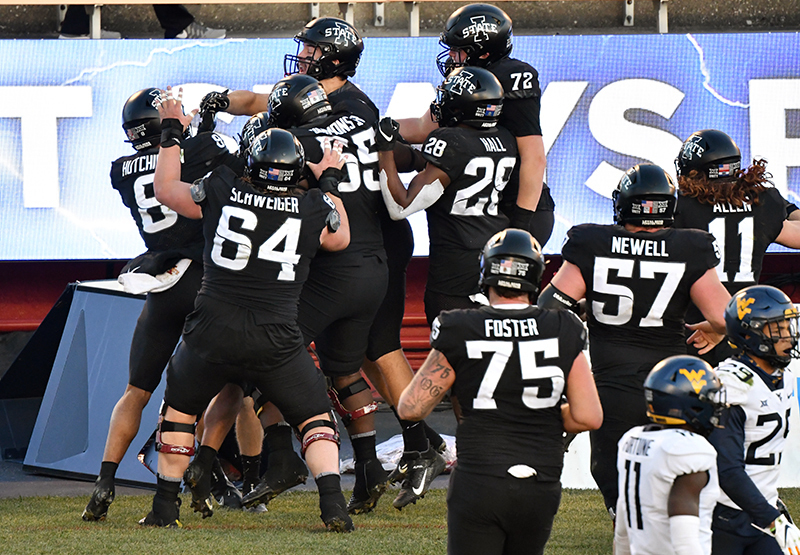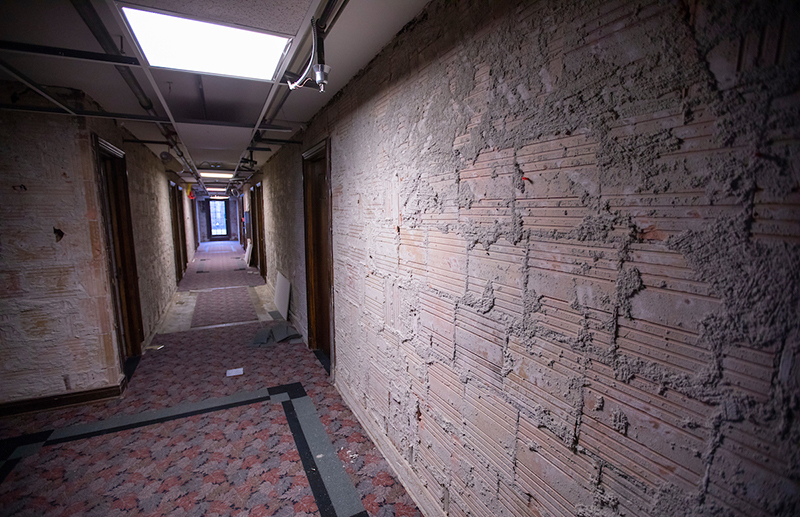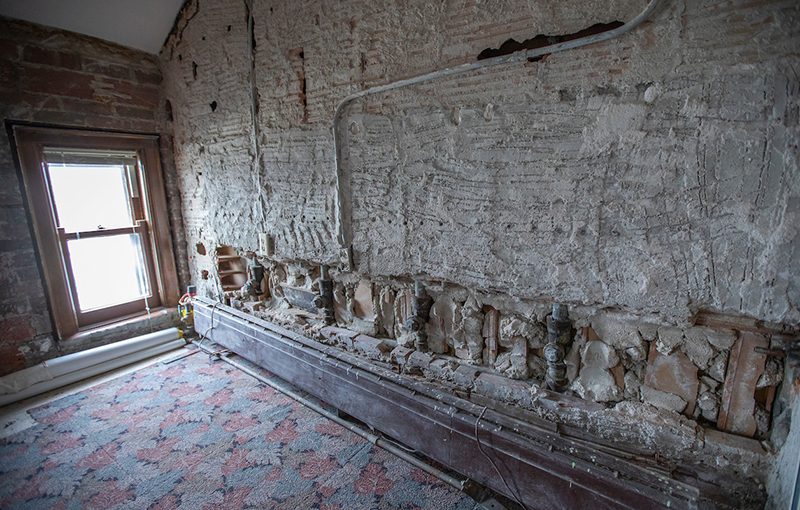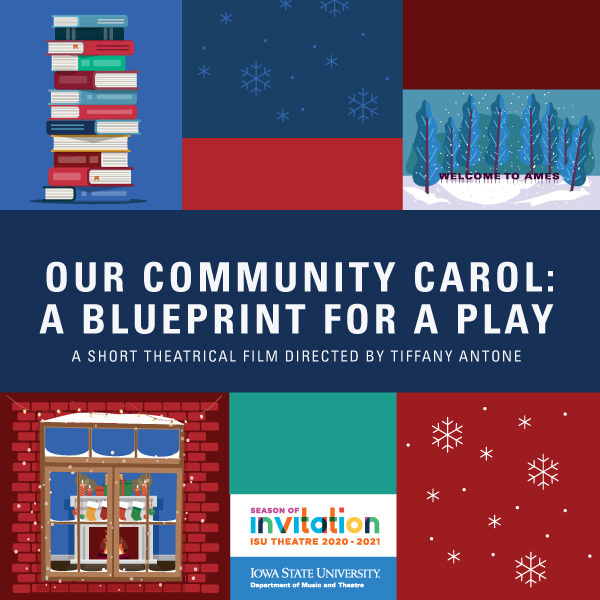History-making season

Photo by Luke Lu, Iowa State Athletics.
Members of the Cyclone football squad gather in the end zone to celebrate another touchdown during the team's final regular season win over West Virginia Dec. 5 at Jack Trice Stadium. With an 8-1 record in conference play, Iowa State has earned its first-ever berth in the Big 12 football championship game Dec. 19 (11 a.m., AT&T Stadium, Arlington, Texas), where it will face Oklahoma for the second time this season.
Due to the COVID-19 pandemic, the Big 12 Conference is allocating just 5,000 tickets to each participating university. Iowa State will distribute its allotment to family members of players, coaches and support staff (550 tickets), ISU students (500) and Cyclone fans -- either Cyclone Club members who made their annual gift in 2020 or non-donors who purchased 2020 football season tickets (3,950).
Iowa State's last football conference title (a shared title) came in 1912 in the Missouri Valley Intercollegiate Athletic Association, which later would become the Big Eight Conference. Iowa State has been a member of the Big 12 Conference since it launched in 1996.
ISU planning is underway for vaccine rollout
An initial supply of COVID-19 vaccine is expected to arrive in Iowa this month, and Iowa State is preparing to help the state implement its distribution plan.
Under the Iowa Department of Public Health strategy for a phased approach to vaccine rollout, the limited amounts of vaccine available in the coming weeks will go first to health care workers and long-term care facilities. State officials expect Iowa to receive 172,000 vaccine doses in December.
According to a Dec. 9 campus message from associate vice president for student health and wellness Erin Baldwin and COVID-19 public health coordinator Kristen Obbink, ISU's public health and emergency operations teams are working closely with state and local partners on vaccine distribution preparation, including a comprehensive vaccination plan for the general public once supply is more widely available. Thielen Student Health Center is authorized to administer the vaccine on campus to students, faculty and staff.
The U.S. Food and Drug Administration is expected later this month to approve emergency use of vaccines developed by Pfizer and Moderna. Both vaccines require two separate injections a few weeks apart. To be stored longer than 30 days, the Pfizer vaccine needs to be frozen at temperatures of minus 94 degrees F. Iowa State has secured ultra-low temperature freezer space for vaccines.
While the COVID-19 protocols in campus offices and classrooms during spring semester 2021 will be similar to fall 2020, the availability of vaccines could mean big changes by next fall, senior vice president and provost Jonathan Wickert told the Professional and Scientific Council at its Dec. 3 meeting.
"Looking forward to the fall, it's certainly my hope that things will start coming closer to what we remember as normal once the vaccines become widely available," he said.
Wickert said widespread vaccination of the campus community is unlikely by the start of spring semester on Jan. 25.
Preparation, communication are key for winter session
For Jan Lauren Boyles, it seemed like a natural extension of what she has done since coming to Iowa State. The associate professor in the Greenlee School of Journalism and Communication jumped at the chance to turn her summer course into one of 55 offerings undergraduate students can choose for the upcoming winter session.
"When I first joined Iowa State in 2014, I was a big proponent of online and distance learning," she said. "I started teaching a class in the summer of 2015 and have done it every summer since then."
Boyles will teach the 400-level course Communication Technology and Social Change for the online session that opens Dec. 14 and concludes Jan. 21 with final exams. It's a six-week summer course, so Boyles had to pare it down to fit the 25-day winter session.
"It is a significant lift because you have to repackage the content, redesign a syllabus, create new content in a digital-only format and keep it updated," she said.
It took Boyles three months to prepare the course for the summer session and another month to have it ready for the winter session.
In mid-November, President Wendy Wintersteen said more than 2,500 students had enrolled in a winter session course.
Condensing a course
Sociology associate professor Monic Behnken will teach Deviant and Criminal Behavior, a 300-level course she previously taught in eight- and four-week sessions. Instructional designers in Engineering-LAS Online Learning helped Boyles and Behnken prepare their courses for the winter session.
"They helped align the learning outcomes and learning objectives so you are balancing between a course with enough substantial academic rigor and a manageable workload for students," Boyles said.
The Center for Excellence in Learning and Teaching also provides instructors with guides for teaching a condensed-format course.
Associate teaching professor in genetics, development and cell biology Sayali Kukday started at the end and worked backwards to determine the most important information, rather than trying to cram everything into the shorter timeframe. Kukday is teaching a 200-level introductory biology course.
"I have a pretty good sense of my learning objectives, and that is the starting point," she said. "Instead of worrying about all the content, you are providing the students with the tools to help them learn."
A single course in a short amount of time is a significant undertaking for students. She expects her students to spend about nine hours per course credit a week outside of class to complete the work, Kukday said.
Behnken presents her course through a case-based study model where students learn by reading specific criminal or court cases. She does not test, but finds other ways to assess student understanding.
"The students have a series of short quizzes," Behnken said. "Instead of long tests, this allows me to assess their knowledge fairly quickly and frequently throughout the course."
The final assessment also has a twist.
"Students have a chance to choose their own adventure," Behnken said. "They pull together everything they have learned and have the option to present their final project in a way that is authentic to them. I have had papers, videos and meme collages."
Boyles uses weekly assignments, small-group activities and discussion boards to keep students engaged on a day-to-day basis, and goes beyond basic memorization for her assessments.
"I lean toward narrative and essay exams so students have to synthesize the content and think deeply about it," she said.
Making them successful
Communication is key for both students and instructors to have success in the winter session, Boyles said.
"Be an active mentor, and your presence as an instructor is so important," she said. "I meet with every student in the class one-on-one in the first two weeks via Zoom. In those conversations I get to know them, but also they get to know me."
Kukday said building a sense of community is the biggest challenge so students have both the instructor and each other as resources.
"I send a survey out right away to get a sense of their goals, what they are feeling and what their schedule looks like," she said. "Based on the responses, I design weekly synchronous help sessions for students. I use a trivia platform to get them engaged and start conversations."
Kukday also is considering having students listen to a podcast on well-being before sharing their thoughts on it.
Future use
Kukday is taking a scientific approach to evaluating the winter session as the university decides if it will become a permanent part of the academic calendar.
"In the scientific world we make hypotheses, collect the data and then make conclusions about it," she said. "Once we determine if it was a success and if it facilitated student learning, we can make decisions about offering it again."
Boyles would be in favor of having a winter session in future years as a way to offer students academic flexibility and even relieve boredom over a long holiday break.
"They can still work or do other activities, but this is a nice added benefit," she said. "It also gives faculty a chance to become more comfortable and confident with online teaching through a single course."
What to know about flex accounts as year-end deadline nears
EDITOR'S NOTE: A temporary change to federal law allows employees to reimburse eligible 2021 expenses with any leftover money contributed in 2020 to health or dependent care flexible spending accounts. For more details, see this Inside Iowa State story published Jan. 28, 2021.
As the end of 2020 approaches, so does the deadline for incurring expenses that can be paid with a flexible spending account (FSA).
Employees can opt to use a flex account to avoid payroll and income taxes on up to $5,000 in dependent care spending or $2,700 in out-of-pocket costs related to health care (increasing to $2,750 in 2021). The amount to contribute via payroll deductions in the coming year is elected annually during open enrollment in November.
Iowa State's FSA administrator ASIFlex processes claims and reimbursements. Funds are reimbursed when employees file a claim for either their own expenses or those of eligible dependents. Claims must be filed by April 30 of the following year.
The health and dependent care accounts are separate and operate under slightly different rules. Here's what employees should know:
Health care
ISU's health care FSA allows a maximum of $550 in unused health care contributions to be carried over to the next plan year. The carryover does not count against the maximum contribution for the year and is added to the available funds. Employees who did not enroll in health flex for 2021 still have access to any carried over funds from the 2020 plan year.
Dependent care
New for the 2021 plan year, ISU's dependent care assistance program (DCAP) will have a "grace period" that extends the amount of time to incur a claim to March 15. Under ISU's current program, only claims incurred during the calendar year are eligible for reimbursement. The change provides an additional 2.5 months to incur a reimbursable claim. Employees who did not enroll in DCAP for 2021 still have access to any unused funds from the 2020 plan year during the grace period.
Claim deadline
All claims must be filed by April 30 following the end of the plan year. Any funds that exceed the FSA carryover or aren't used during the DCAP grace period are forfeited and may not be rolled over into another account or refunded. Forfeited funds are used by Iowa State to help defray the administrative costs of the plan.
Questions?
Check out this FAQ on flex accounts. Employees with questions may contact the benefits team at 294-4800 or benefits@iastate.edu. For questions about plan rules and the tax impact of these accounts, contact the payroll, benefits and tax office at fbac@iastate.edu.
Yearlong renovation begins upstairs at the Memorial Union

Sketch looks west from the elevators and reception area on a renovated fourth floor. Image courtesy of Invision Architecture.
The top three floors of the Memorial Union (MU), which have worked hard for 92 years -- as hotel rooms, student living space and most recently employee temporary offices -- are getting a major renovation beginning next month. Sometime around March 2022, seven student-focused service offices will move into modern, comfortable, daylit work spaces. The $10 million renovation will eliminate some deferred maintenance and replace the heating, cooling, plumbing, electrical, communications and security systems for floors four, five and six -- roughly 23,000 gross square feet total. But it also represents huge gains in getting more student-centered activities into the student union.
"With this project, we begin the process of expanding the services and spaces we're able to provide to the student body and the campus community," said MU associate director Brad Hill. "We're excited that the ISU student body has committed to investing in the MU through this renovation so we can continue to provide a safe, dynamic and welcoming environment for all."
Hill said many of the building's deferred maintenance issues aren't unusual in structures nearly 100 years old. But the list is growing, and he said it's critical to invest in remedies.
"This renovation also provides us the opportunity to take a small step in addressing the large amounts of deferred maintenance throughout the building," he said.
Student-friendly space

Abatement crews have removed wall plaster containing lead paint. Pictured is the fifth-floor hallway looking east. Photo by Christopher Gannon.
A demolition phase, which will begin the first week of January and account for about 10% of the project, will remove all interior walls except those surrounding two central elevators and southeast and southwest corner stairwells. Abatement, primarily of lead-based wall paints, is complete on floors five and six, and will continue on the fourth floor after the final Ivy College of Business tenants return to Gerdin offices this month.
Replacing narrow corridors and small rooms will be a brighter, open floor plan that provides central work and student collaboration spaces and distributes staff offices around the perimeter. Restrooms and a shared reception area will be centrally located on each floor, and the peak ceiling uncovered on the sixth floor.
While numerous additions to the Memorial Union created expansive lower levels, its top floors are noticeably smaller -- about 15 yards wide and 46 yards long on floors five and six, longer at 66 yards on the fourth floor. When the renovation is complete, tenant assignments will look like this:
- 6: Student Legal Services, ISCORE/NCORE, Lectures Program
- 5: Study Abroad Center, Veterans Center
- 4: The Center (LGBTQIA+ Student Success), International Students and Scholars
"This project will improve the quality of everyone's experience," said project manager Kerry Dixon, facilities planning and management. "It's cleaner, brighter space for the staff who will work there, and students will have an easier time finding these services."
Dixon said features of the redesign respect the history and architecture of the Memorial Union while modernizing it "for the next 100 years."
Access
All demolition materials and new building materials will go down and up the east exterior of the building, using a fifth floor outdoor patio as a staging area. Similar to when the MU's slate roof was replaced in 2016, the north entrance to the Memorial Union parking ramp will close later this month to make room for scaffolding and a crane and remain closed for a year. The ground-level east entrance to the MU will remain open during the renovation project.
Funding
The state Board of Regents, which approved the project a year ago, is scheduled to sell Memorial Union revenue bonds over two years to fund the project, and student activity fees will help repay the bonds.
In the spring of 2017, ISU students voted down a $65 million renovation proposal that would have tackled many of the building's deferred maintenance and programmatic needs. MU leaders opted to break down those needs into smaller projects, of which this is the first. The second floor (Great Hall level) and the third floor in the east Memorial Union are likely future projects, as funds are identified, to revive existing space and better serve students.
A little history
The Memorial Union opened in the fall of 1928 and has received 11 additions since then, including a parking ramp in 1967. The top two floors actually were left unfinished until 1937, when the fifth was completed as a second hotel floor and the sixth as a student dormitory with a central bathroom. In 1974, the sixth floor was renovated as a third hotel floor.
The Memorial Union hotel closed in July 2016, and for two academic years, 2016-17 and 2017-18, those three levels functioned as a student residence hall to help meet the demand for on-campus housing. For the last six years, many of the rooms also have served as temporary offices, including for faculty and staff whose home buildings -- Marston, Curtiss, Gerdin -- were being renovated.

Sketch depicts the central reception area on each floor. Image courtesy of Invision Architecture.

When crews removed wall plaster during abatement, they uncovered in this wall sink plumbing remnants from a dormitory-style bathroom on the sixth floor. Photo by Christopher Gannon.
Numerous resources can help students with mental health
ISU employees who interact closely with students -- faculty, advisors and managers of student employees -- are crucial in creating a supportive community of care that's needed more than ever during the pandemic, Fallyn Lee, senior psychologist for student counseling services, told Professional and Scientific Council members last week.
Prior to COVID-19, 1 in 3 college students nationwide reported a significant mental health concern, Lee said. Nationwide, an estimated 80% of students said the pandemic has had a negative impact on their mental health, and 1 in 5 said their mental health is significantly worse, according to data she shared in a presentation at the Dec. 3 meeting.
Take care of yourself
Self-care isn't selfish. It's essential when supporting others. Here are some tips for ISU employees from student counseling services director Christopher Hanes.
"A lot of what we've seen in the fall semester and what we're likely to continue to see is a significant disruption in our daily lives and our rhythms and just how we go about the day-to-day," Lee said. "We as humans really like certainty. We really like to know what's coming next so we can prepare."
Lee outlined the expanding mental health resources available to students, which in addition to student counseling services includes the Thielen Student Health Center, the Student Wellness office, the Therapy Assistance Online self-help app and ULifeline, which provides mental health screening tools and resources.
"We have so many different resources to offer students," Lee said.
There's no need for students to wait for help. Counseling staff offer same-day services for first-time requests for assistance, with a team of five to seven clinicians assigned to initial appointments Monday through Thursday from 8 a.m. to 3 p.m. Students who want more informal contact can use the Let's Talk service for brief consultation, problem solving and support 10 a.m.-noon Tuesday, Wednesday and Thursday. Crisis counselors are available 24/7 by texting "ISU" to 741741.
With limited exceptions, counseling has been offered virtually since the pandemic began, Lee said. Students can call counseling services at 515-294-5056 to get started.
Conflict of interest form in AccessPlus retires next month
The university's Conflicts of Interest and Commitment (COIC) disclosure form is moving Jan. 1 from AccessPlus to IRBManager. All faculty, professional and scientific staff, postdoctoral associates, graduate assistants and contract employees complete this form annually to report any external activities or financial interests with the potential to interfere with their university duties.
IRBManager is the electronic system ISU scientists have used for about three years to manage research projects involving human subjects. Despite the research-sounding name, it can accommodate many kinds of compliance processes. With the change, direct supervisors will approve their employees' COIC forms, and any subsequent management plans are stored -- and easily accessed -- in IRBManager.
Around Jan. 20, 2021, supervisors will receive an email inviting them to complete the COIC form and share the request with their direct-report employees. The email will include a link to the COIC form; the Okta dashboard also will contain a new button, "COIC."
Brooke Langlitz, associate director of the office of research ethics, said the new COIC disclosure form is user friendly and offers features not available in the legacy system. Routing of the completed forms will follow Workday's supervisory organizations. Langlitz said the long-term goal remains to move the COIC function to Workday once a robust management module has been developed. IRBManager provides the option now to retire the COIC disclosure function in AccessPlus.
Questions about the new COIC process may be directed to Lynn Comito, office of research ethics, coi@iastate.edu, 294-3324.
Required syllabus statement gets time on senate agenda
University counsel Michael Norton addressed the intersection of faculty academic freedom and student freedom of expression during the Dec. 8 Faculty Senate meeting.
Norton discussed the university's adoption of the required syllabus statement which instructors should begin using in the winter session.
"The statement doesn't present anything new," he said. "The statements about academic freedom and free expression contained in the syllabus statement have always been policy and law with respect to these issues. It is just new going into syllabi across campus."
Senior vice president and provost Jonathan Wickert said the syllabus statement addresses recent issues on campus and free speech issues on college campuses across the nation.
"We have had situations on our campus where there has been confusion or misunderstanding around some of these issues," he said. "This statement is intended to help clarify that for students as well as faculty."
The goal of the statement is to inform the campus community and help faculty, Norton said.
Faculty members select the course material and decide how best to present it. They also have the responsibility to teach in a professional manner while respecting the rights of students to offer differing opinions.
"Students have the right to be evaluated solely on an academic basis and not on opinions or viewpoints that are unrelated to academic standards," Norton said. "But students must maintain appropriate behavior. No matter what their personal viewpoints are, students have the responsibility to learn the course material."
Faculty evaluation
Senators will vote at the January meeting on revisions to the Faculty Handbook that includes documenting equity, diversity and inclusion activities and the impact of that work as an encouraged component of faculty evaluations.
The proposed revisions also align the types of reviews that can be used to evaluate faculty. ISU currently uses annual reviews, preliminary reviews of probationary faculty, and promotion and/or tenure review. The proposal would correct the list by adding advancement reviews for term faculty, post-tenure reviews and renewal reviews.
Other business
Senators will vote next month on a name change for the department of sociology to the department of sociology and criminal justice. It reflects the current makeup of the three distinct majors in the department -- sociology, criminal justice, and agriculture and society. In 2018-19, 376 undergraduates were enrolled as criminal justice majors and 61 in sociology.
Senators voted to approve:
- Changes to the Faculty Handbook section on discrimination and harassment to include abiding by ISU's Title IX sexual harassment, sexual assault, dating violence, domestic violence and stalking policy.
- Changes to the graduation with distinction policy that moves the GPA qualifier from the beginning of a student's final term to completion of all degree requirements. Undergraduates can graduate with distinction if they have at least a 3.50 cumulative GPA after meeting all degree requirements. The recognition is on the student's official transcript and diploma.
- A beverage management minor in the apparel, events and hospitality management department. The minor, requiring 15 credits, will prepare students to understand the intricacies of beverage development, their use and the operation of a beverage establishment. No Iowa regent university has a beverage management major or minor.
- A name change for the child, adult and family services major and minor to human development and family studies. It aligns the university with peer institutions and helps students better identify the program.
- A minor in ethics in the philosophy and religious studies department. The 15-credit minor will explore theories and applied topics in ethics and provide background for students in business, law, agriculture, medicine, psychology, education and other fields.
ISU Theatre presents 'Our Community Carol: A Blueprint for a Play'
It's been a tough year for traditions but a good one for innovation. ISU Theatre is bringing audiences both with an inventive short film based on a Charles Dickens holiday classic. "Our Community Carol: A Blueprint for a Play," streaming Dec. 11-30, is filled with holiday magic and heartwarming reflections on the Ames community.
Details on how to access the stream are posted on the show’s production page. Admission is "pay what you will."
Tiffany Antone, assistant teaching professor of theatre and project facilitator, came up with the idea for the show last spring. She envisioned it as a stage adaptation with audience interaction. But with live theater on pause during the COVID-19 pandemic, ISU Theatre had to trade "curtain up" for "lights, camera, action."

"We started the semester with a lot of hope and wild ideas and began to get ready for the experiment of making a movie," Antone said. "It's been an exercise in incredible amounts of innovation and collaboration in a very compressed time period."
A team of nine students and faculty penned the script that tells the story of three bored theater ghosts who imagine a modern-day, Ames-based version of Dickens' "A Christmas Carol." With a little ghostly interference, they help a student named Tiny and other Ames residents come together as a community.
More than 50 students, faculty and staff helped produce the 60-minute film in 14 weeks. George Poll, a freshman in performing arts, was a member of the screenwriting team and also plays the role of Tiny's sister.
"We did the round-robin style where you write and then edit another scene," Poll said. "It was cool to see how different people brought different ideas to the table."
Producing a short film during a pandemic has been an intricate process. How do you limit the number of actors on stage per scene? How do you design props, normally seen at a distance from stage, with enough detail for a close-up shot? How do you create enough sets for an entire film? The creative solution to the last question involved a green screen backdrop and sets that were drawn on paper, digitized and then inserted during postproduction with animated special effects.
“Our Community Carol” also incorporates citizen artistry through community engagement. The script includes references to the Boys and Girls Club of Story County, the Ames Public Library, the Food Bank of Iowa and others, in hopes that audiences may be inspired to give or receive help as needed this year.
"I hope people at the end can reflect on what they are thankful for this holiday season," Antone said. "It's a season of challenge. We may have to make tough decisions about spending time with our loved ones this year and that makes it harder to celebrate and feel the joy. I hope people can embrace the possibilities around them and find ways to connect in the places where they are.
"I also hope you laugh and have a good time."
Smaller 'Sugarplum' stands in for 'Nutcracker Ballet' this month
Stephens Auditorium will host "Sugarplum Celebration," a holiday ballet featuring dancers from the Ames-based Iowa Youth Ballet (IYB), on Sunday, Dec. 13. Two shows, at 1 p.m. and 6 p.m., also will be livestreamed due to capacity guidelines for the auditorium. The show features 19 holiday-themed dance pieces by 11 choreographers performed by approximately 85 dancers.
Tickets are $13 in advance and $15 day of show (if seats still are available). Livestream prices are $13 for an individual stream and $23 for a group stream.
The Iowa State Center's 40th annual "Nutcracker Ballet" production was canceled due to the COVID-19 pandemic, a decision that impacted hundreds of children who participate in it. "Sugarplum Celebration" replaces "Nutcracker Ballet" this winter.
"With the uncertainty of the pandemic and the desire to honor the 40th year of the Nutcracker properly, we canceled this long-running holiday event in September," said Tammy Koolbeck, Stephens Auditorium executive director. "Shortly after, we began working with Iowa Youth Ballet on an alternative holiday ballet that would work within our venue's COVID-19 guidelines for backstage and front of house.
"We are pleased that the months of planning will allow our community's young dancers to perform this shortened ballet program," Koolbeck said.
IYB was created as a nonprofit dance company in 2001, led by executive director Robert Thomas and artistic director Miyoko Kato Thomas, who also serve as artistic directors of the "Nutcracker Ballet." It provides aspiring young dancers the opportunity to study ballet in a professional-like environment.
